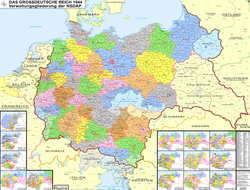Gau Baden
| Gau Baden Gau Baden–Elsass | |||||
| Gau of Nazi Germany | |||||
|
|||||
|
Flag |
|||||
| Gau Baden on the far left, bordering France in 1944 | |||||
| Capital | Karlsruhe (1933–40) Strasbourg (1940–45) | ||||
| Gauleiter | |||||
| • | 1926–1945 | Robert Wagner | |||
| History | |||||
| • | 24 March 1926 | ||||
| • | Disestablishment | 8 May 1945 | |||
| Today part of |
|
||||
Flag
The Gau Baden, renamed Gau Baden–Elsass (Gau Baden-Elsaß) in 1941, was a de facto administrative division of Nazi Germany from 1933 to 1945 in the German state of Baden and, from 1940 onwards, in Alsace (German: Elsaß). The gau effectively supplanted the area's regional subdivision of the Nazi Party, which had been active from 1926-1933.
The Nazi Gau (plural Gaue) system was originally established in a Nazi Party conference on 22 May 1926 in order to improve administration of the party structure. From 1933 onward, after the Nazi seizure of power, the Gaue increasingly replaced the German states as administrative subdivisions in Germany. In 1940, after Germany occupied the French region of Alsace, Gau Baden incorporated the two Alsatian départements of Bas-Rhin and Haut-Rhin, becoming Baden-Elsass. The seat of the Gau administration was originally Karlsruhe, but moved to Strasbourg after the German occupation of France.
At the head of each Gau stood a Gauleiter, a position which became increasingly more powerful, especially after the outbreak of the Second World War, with little interference from above. Local Gauleiter often held government positions as well as party ones and were in charge of, among other things, propaganda and surveillance and, from September 1944 onward, the Volkssturm and the defense of the Gau.
...
Wikipedia


